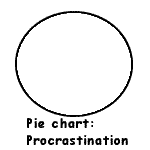A Community Contribution from Sarah From
A recent article in the New York Times highlights new research on a fascinating phenomenon: the procrastination of pleasure. Not only do we  avoid the tasks we dread, we also put off activities we enjoy. Redeeming gift cards, using frequent flier miles, and visiting hometown landmarks all belong to the category of activities we express the desire and intention to do, but chronically put off to another day.
avoid the tasks we dread, we also put off activities we enjoy. Redeeming gift cards, using frequent flier miles, and visiting hometown landmarks all belong to the category of activities we express the desire and intention to do, but chronically put off to another day.
When we put on our GTD glasses we can see one relatively simple approach to this problem: clearly define the very next action. Like all forms of procrastination, pleasure procrastination can result when we are not sure what to do next. Faced with an ill-defined task, we find it easier to ignore the item than to figure out how to do it. It takes shockingly little to derail us into full-on procrastination. Consider what happens if I put “use Target gift card” on my Next Action list. Though I am excited to use the gift card – I need new storage containers for my closet, and the extra money is much appreciated – months pass with no trip to Target. Each week, “use Target gift card” reappears on my Next Action list. What’s going on here?
When I finally address this question during a Weekly Review, I realize that “use Target gift card” is actually not a task, but a project with multiple steps. Since I intend to use my gift card to purchase storage containers to fit in my closet, I need to measure my closet first. I want to check out a newly opened Target I’ve never been to before, so I need to map out how to get there. And since I can only go after work on a weeknight, I need to find out how late the store is open before I make the trip.
If not properly identified, any one of these simple pre-shopping tasks is enough of a roadblock to cause me to procrastinate indefinitely. Once I clarify that my next action is actually “measure the closet,” my trip to Target can really get rolling.
While clarifying the next action isn’t the key to averting pleasure procrastination in every situation (I think refocusing our attention on the present is a big part of it too), one thing is certain: even our best intentions can be derailed when we are not sure what to do next.
What’s your perspective? Are there other components of the GTD system that can be helpful in addressing pleasure procrastination?


Hi Sarah,
Thanks for bringing these interesting findings to our attention. It might have helped to have taken a less GTD-centric approach to your post, however, and focused more on the findings of the research.
The take-home message of the science is that people are bad at predicting how much free time they’ll have in the future, and overestimate. It’s likely that next-action thinking, even as powerful as it is, will have any effect on building people’s predictive power. A better approach might be to spend a bit of time assessing how one might build free-time in and putting free time into one’s hard landscape, thus avoiding the prediction trap altogether.
Many best wishes,
Tara
I agree with this article. I had an American Express gift card in my wallet for over two years. I thought putting it in my wallet would be enough to remind me to use it. Nope. It wasn’t until I decided to use it for something specific that I finally made progress on using it. In my case, my next action was to call the store (it’s a small, local store) to make sure they would accept it. After I decided what I was going to use it for, it took only about two weeks to schedule a trip to the store, and then spend it.
Sarah, I think Patricia noted something that you glossed over. You have already completed the first next action; you have decided that you want to redeem your Target gift card for storage containers.
I recently used a gift card from Canadian Tire that I had been sitting on for quite a while. There was nothing I really needed to buy nor anything that I really wanted so I was not motivated to use it. After waiting for several months three items that I kind of wanted went on sale in the same week so I got the double whammy of deep discounts and free money that justified the purchase of some nice-to-have tools.
I looked at it as exercising the GTD principle is being ok with not making the decision right now. If you are not really sure what you want then you can put the gift card in your tickler file (make sure it will not expire before you get to it!) and forget about it safe in the knowledge that it will be brought to your attention later.
Thanks for posting the article. I always think it’s ironic how we can stuff our diaries with things we want to do, and then get really stressed at the thought of doing them…
Thanks for the article, Sarah. Another piece of the GTD puzzle this touches on for me is feeling like I have the time and space in my life to do something fun. I’m an acupuncturist, and one of my hobbies is stone sculpting. The down side of this hobby is that I can’t really spend 15 minutes on it. It requires at least a couple hours by the time I’ve set everything up and cleaned up after myself. (Don’t have a dedicated workshop yet) :)
When I don’t have everything down on my next action lists and I have the nagging feeling that there is more left undone and floating around, I can’t let myself relax and take a few hours to carve. It’s only when I know that I’m not dropping any balls that I can let go of work and life duties and enjoy.